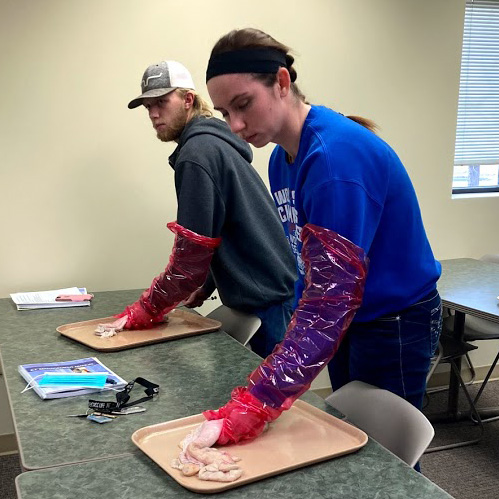NCTA, ABS teach A.I. at the Red Barn

By Malina Lindstrom, student writer
In the past nine years, Doug Smith and Larry Rowden have taught more than 570 students armed in long red, plastic sleeves how to artificially breed a beef cow in the “Red Barn” at the college in Curtis.
Maddy Carr of North Platte is one of their pupils.
“I have watched our vet back home A.I., and I thought it would be really neat to learn and be able to do it on my own cows in the future,” says Carr.
She is a Veterinary Technology and Agriculture Production student at the Nebraska College of Technical Agriculture.
Hands-on courses in artificial insemination teach NCTA students proficiency in a technical skill, says Smith, animal science professor and livestock judging coach. Plus, A.I. offers greater marketability as graduates enter the workforce or make management decisions in their own operations.
A.I. School
In Rowden and Smith’s joint effort, they teach a two- to three-day college credit course and certify students in A.I. Rowden, of Broken Bow, is district business manager for ABS. He teaches the first portion of the class, outlining the intricacies of bovine reproductive anatomy. He works to ensure students maintain a safe, calm, and comfortable atmosphere in working with large livestock.
Smith teaches proper semen handling techniques and how to use A.I. equipment. He also instructs the technical skills to observe estrus detection and estrus synchronization methods used in beef cattle.
This knowledge won’t prove beneficial unless pupils make educated decisions, he emphasizes. Smith also leads lessons on bull selection and EPDs (expected progeny differences) which enable producers to bring the most influential genetics into their herds.
Once training and practicing the A.I. techniques in the classroom and on cows in NCTA’s Red Barn is done, students complete the course with practical and written exams.
Program Value
Smith and Rowden believe that training individuals for A.I. programs proves beneficial to anyone interested in cattle production.
“A.I. opens up the opportunity to add management tools to the proverbial toolbox as a successful manager and producer,” says Smith. “It also makes the enhancement of genetics in a beef or dairy herd that much more attainable.”
Course value for NCTA students and other producers who take the class is echoed by Rowden. Technical skills prepare students for employment in cattle operations. Also, Nebraska has high demand for A.I. technicians in the dairy industry as dairy cows and heifers are bred year-round, not just seasonally as in purebred or commercial beef herds.
Rowden appreciates his teaching experiences at NCTA. “I enjoy the interaction with the next generation of people who will keep animal agriculture an important part of our rural American life and business.”
Shaping Careers
Aggie alumni of the NCTA/ ABS A.I. school value the technical knowledge gained for their careers.
Cory Johnson of Burwell graduated from NCTA in 2014. When he took the class in 2013, Johnson’s family wanted to implement A.I. to improve herd genetics and launch a heifer development program. His A.I. skills were useful to the family’s operation. However, when markets were high, they got out of the cow business. Johnson now farms his own ground, along with helping at his family’s farm and backgrounding lot, and has a custom silage chopping business.
Johnson, a former state FFA officer, appreciates the education which prepared him for work in ag lending in addition to farming.
“The college is strategically designed to utilize its resources to give students real life experiences in livestock production,” he says. “NCTA also does a tremendous job of connecting industry leaders and students, resulting in smooth transitions into employment and business.”
Bailey Hinrichs, 2017 NCTA graduate, was certified in A.I. in 2016 and is still applying the skills on her own Charolais cattle operation near Glenvil. Shortly after taking the class, Hinrichs interned at the Fred Ranch, using the skills to A.I. service 150 cows. Hinrichs says her knowledge has been instrumental to the partnership she and her family have in raising and marketing purebred bulls and replacement females each spring.
Students Experiences
In sub-zero temperatures over a February weekend, 20 Aggie students took the A.I. course at NCTA. They later shared some experiences.
Cauy Bennett of Elwood, First Year in Livestock Management
“I plan on trying my new A.I. and reproductive knowledge at my family ranch where I will be breeding some of our replacement heifers. But I also am hopeful this certification will increase my career opportunities in the future.”
“I think it is very important to have technical skills in specialized areas like this because first, you have the knowledge and skills for your own operation, but also you have it for more job opportunities.”
Avery Bermel of Curtis, Second Year in Animal Science
“I work at the Nebraska Bull Service in McCook, so I was interested in getting experience on both sides of the A.I. industry. I also would like to start A.I. breeding my own cows at home."
“Skills like these are critical as they affect our generation in this industry. NCTA offers a high level of these technical classes to best match the interests of their students.”
A.I. Classes
The next A.I. Schools are Feb. 26-27 and March 12-14. The courses fill quickly, but there are still spots open to the public in March. Both non-NCTA and enrolled students are welcome. For information, contact Doug Smith at 308-367-5286 or doug.smith@unl.edu.
Download a PDF of this press release